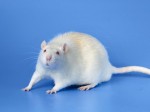 No, not for the black death. That wasn’t rats fault, it was parasites living on rats. Instead, researchers examined how rats reacted and how they felt after making poor choices. The orbitofrontal cortex and the ventral striatum parts of the brain are used when expressing regret. People with damaged orbitofrontal cortexes don’t experience regret.
No, not for the black death. That wasn’t rats fault, it was parasites living on rats. Instead, researchers examined how rats reacted and how they felt after making poor choices. The orbitofrontal cortex and the ventral striatum parts of the brain are used when expressing regret. People with damaged orbitofrontal cortexes don’t experience regret.
The scientists put electrodes in the brains of rats, and ran them through a choice maze. This maze has 4 openings that lead to different kinds of food, some taste, others no so. After choosing a path the rats hear a tone indicates how long they’ll have to wait before getting the food (1 – 45 seconds). They can choose to take another path or stay where they are. If they skip this food, and end up with a worse food (bummer, no chocolate), 2 things happen: the rats look back at the path they were in, and the regret portion of the brain would be used.
What’s more, “just like humans,” says Redish, the rats were more likely to take a “bad deal”—or wait longer than they normally would for their next piece of food—after a regretful decision. The rats would also hastily consume food that stemmed from a bad choice, spending only about five seconds with the treat. Normally the rats would spend about 20 seconds grooming themselves and eating their food.
